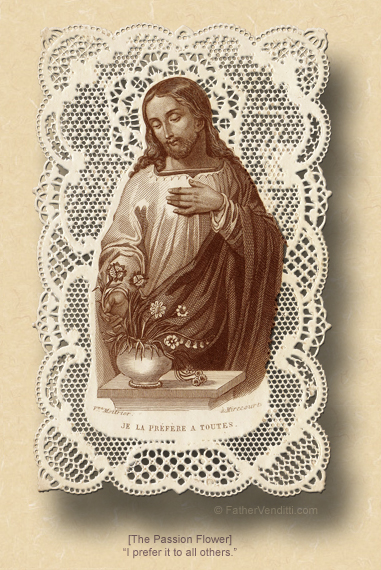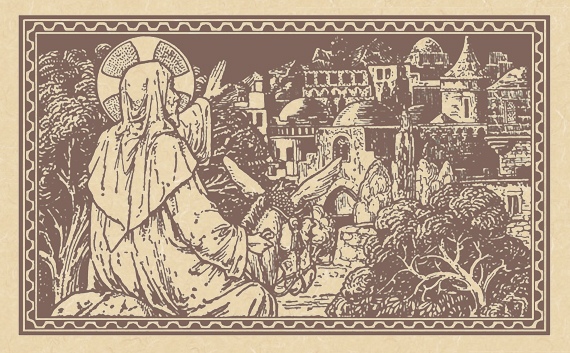The Only Adult in the Room.
The Fifth Saturday of Lent.*
Lessons from the feria, according to the ordinary form of the Roman Rite:
• Jeremiah 11: 18-20.
• Psalm 7: 2-3, 9-12.
• John 7: 40-53.
Lessons from the feria, according to the extraordinary form of the Roman Rite:
• Isaiah 49: 8-15.
• Psalm 9: 14, 1-2.
• John 8: 12-20.
FatherVenditti.com
|
 6:50 AM 4/6/2019 — I don't know—those of you who assist at Holy Mass daily—how much attention you pay to the flow of the Scripture lessons presented, but if you do you might be a bit confused because the events we've been reading about this week have been presented to us out of sequence. Yesterday's Gospel lesson opened with our Blessed Lord traveling about Galilee preaching; but, the Feast of Tabernacles is approaching, so the question for our Lord and His disciples becomes whether to go to Jerusalem for the feast or not. The argument is presented that they should not because the authorities in Jerusalem have put a bounty on His head; but, inasmuch as many of His family and friends are going, He ultimately decides to go, but secretly. This is not because He's afraid to die, obviously; it's because He can't rush into His passion too early: the plan that God has mapped out for the salvation of mankind centers around Passover, ordained by God from the beginning of time. So, our Lord purposely needs to be cagey. 6:50 AM 4/6/2019 — I don't know—those of you who assist at Holy Mass daily—how much attention you pay to the flow of the Scripture lessons presented, but if you do you might be a bit confused because the events we've been reading about this week have been presented to us out of sequence. Yesterday's Gospel lesson opened with our Blessed Lord traveling about Galilee preaching; but, the Feast of Tabernacles is approaching, so the question for our Lord and His disciples becomes whether to go to Jerusalem for the feast or not. The argument is presented that they should not because the authorities in Jerusalem have put a bounty on His head; but, inasmuch as many of His family and friends are going, He ultimately decides to go, but secretly. This is not because He's afraid to die, obviously; it's because He can't rush into His passion too early: the plan that God has mapped out for the salvation of mankind centers around Passover, ordained by God from the beginning of time. So, our Lord purposely needs to be cagey.
And this is where the confusion arises, because the Gospel lessons on Wednesday and Thursday of this week consist of the speech that our Lord gives after He’s arrived in Jerusalem, which is all about salvation and the role
our Blessed Lord will play in that drama, which angers the chief priests because He clearly identifies Himself as God.
Today's Gospel lesson is a continuation of yesterday's: more fallout and reaction to our Lord's preaching during this secret but not-so-secret trip to Jerusalem. And it begins with a familiar litany, just like what we read back on the Feast of the Chair of Saint Peter, as everyone tries to figure out Who and What Jesus is: “This is the Prophet … This is the Christ” (John 7: 40, 41 RM3), reminiscent of when our Lord had asked his disciples, “Whom do men say that the Son of man is?” (Matt. 16: 13 Douay-Rheims), and He gets from them all sorts of answers gleaned from Old Testament prophesy: Elijah, Jeremiah, even John the Baptist. The crowd hearing our Lord today seems fixated on two possibilities: the prophet foretold in Deuteronomy 18—“…the Lord thy God will raise up for thee a prophet like myself, of thy own race, a brother of thy own; it is to him thou must listen” (v. 15 Knox)—and the Christ, read Messiah, whom everyone foretold, and of whom the prophet Micah said, “Bethlehem-Ephrata! Least do they reckon thee among all the clans of Juda? Nay, it is from thee I look to find a prince that shall rule over Israel” (5: 2 Knox). Bethlehem, of course, is the city of David, and the one thing all the prophets agreed upon regarding the Christ was that he would be a descendant of King David. And therein lies the problem for many of these people since, while we know that Jesus was born in Bethlehem, they didn’t know it because Jesus, although born in Bethlehem, was raised in Galilee; so, most people thought He was a Galilean by birth, when He was, in fact, a Davidian by birth just as the prophets foretold.
It’s a stupid argument anyway. Where someone is born does not effect whether what he says is true, but it's enough of a discrepancy to cause an argument, with some people praising our Lord and others wanting to arrest Him. And the Gospel lesson ends with a cameo appearance of a man who would go on to play a rather important role in our Lord's Passion, Nicodemus, a Pharisee and a member of the Rabbinical Council, who is presented to us as—to coin a phrase—the only adult in the room.  He's brash enough to speak the one word of reason in this free-for-all debate, which is to simply point out that everything they think they know about Jesus is based on anecdotal evidence—things whispered in market places and learned second hand and third hand—and if they really were interested in finding out anything about Jesus they'd stop debating it and just go and hear Him. He's brash enough to speak the one word of reason in this free-for-all debate, which is to simply point out that everything they think they know about Jesus is based on anecdotal evidence—things whispered in market places and learned second hand and third hand—and if they really were interested in finding out anything about Jesus they'd stop debating it and just go and hear Him.
But the Rabbinical Council—or the Sanhedrin as the Scriptures call it—has already made up its collective mind. Forgive me for making the analogy, but it may be easier to understand it if we relate it to current events: it's like the political establishment faced with the possibility of a popular upstart candidate who isn't one of them. There's nothing our Blessed Lord is preaching that could constitute real heresy; there can be no real argument with a preacher Who inspires people to deepen their faith, especially when He and His disciples are faithful to Jewish custom, worshiping in the synagogue, paying the Temple Tax, observing the Sabbath. But He's not one of them, and the more popular He becomes, the less influence they have.
Reading between the lines, Nicodemus would seem to be the last of the innocents, and that might be born out in the conversation he has with our Lord about rebirth and regeneration just prior to our Lord's arrest; but, I like to think that Nicodemus is more aware than he lets on. At worst, he may be naive in thinking that the Sanhedrin is actually interested in the truth, but he's enough of a man of integrity to at least make the attempt to call them back to some semblance of reason. It doesn't work, with the result of the other members insulting him by accusing him of also being a hick from Galilee, just like Jesus.
But the most striking thing of all about this scene is in the very last verse of today's lesson; and, as usual, the truth of it is really found in the Greek: Καὶ ἐπορεύθησαν ἕκαστος εἰς τὸν οἶκον αὐτοῦ…. The Missal says, “Then each went to his own house” (John 7: 53 RM3), but that's not a correct translation; it's the Aorist tense: they just didn't go home; they each went back “from whence they came.” Like He does for everyone, Jesus is offering them a new life, free from the slavery to sin, free from the concerns of this world, free from the slavery to passions and riches and whatever else enslaves man. Our Lord holds up to them—and to us—the promise of a new life; but, because it does not come from them, because they are not the source and cannot provide it for themselves, they prefer instead to go back to the way things have always been—that, and the fact that, the debate having ended without a resolution, the meeting breaks up and they disperse, no longer unified, no longer together, the only thing they were able to agree upon being that they don't want what Jesus is offering.
Nicodemus will appear two more times before Easter: he will approach our Lord in the dead of night, seeking to understand, and he will assist Joseph of Arimathea in taking our Lord's Body from the cross and laying it in the tomb. On both occasions the only adult in the room this day will prove his worth, and so must we. What Jesus offers to us may be a radical change from the way we've always lived our lives, but He died to give it to us, and that alone should, at least, be worthy of our attention.

* Because Lent began on a Wednesday, today is the fifth Saturday. Cf. the post here under the heading "Hey, aren't you off by a week?" for an explanation of how the days of the liturgical calendar are rendered on this site as opposed to how they are designated in the Roman Missal.
|

